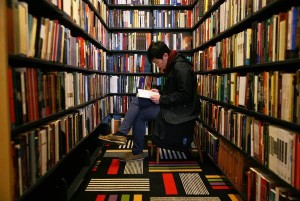In today’s Wall Street Journal “Sightings” column I consider how the shift from bookstore to online book buying is changing American culture. Here’s an excerpt.
* * *
On a recent trip to Chicago, I spent an hour wandering through the Seminary Co-Op, the University of Chicago’s much-loved independent bookstore, which claims to have more than 100,000 titles in stock at any given moment. I bought three books during my visit. One of them, Stephen Parker’s “Bertolt Brecht: A Literary Life,” had been on my literary radar screen since August, when I read the Times Literary Supplement’s review. Not so the others, Todd Decker’s “Music Makes Me: Fred Astaire and Jazz,” which came out in 2011, and “Benny Goodman’s Famous 1938 Carnegie Hall Jazz Concert,” a monograph by Catherine Tackley that was published two years ago. I make a point of keeping up with new books about film, dance and jazz, but somehow I hadn’t heard of either one.
 What’s the point of this anecdote? Just this: It was solely because I visited the Seminary Co-Op that I bought those two books. Yet it had been at least two years, if not more, since I’d set foot in a large brick-and-mortar bookstore. Nor can I remember the last time that I went into a record store of any size. Like a fast-growing number of Americans, I now do virtually all of my book and record buying online. It’s cheaper and infinitely more convenient to click a few keys and be done with it.
What’s the point of this anecdote? Just this: It was solely because I visited the Seminary Co-Op that I bought those two books. Yet it had been at least two years, if not more, since I’d set foot in a large brick-and-mortar bookstore. Nor can I remember the last time that I went into a record store of any size. Like a fast-growing number of Americans, I now do virtually all of my book and record buying online. It’s cheaper and infinitely more convenient to click a few keys and be done with it.
That’s the good part. Here’s the bad part: Nowadays I buy a book or record only because I’m specifically looking for it. But when I went to the Seminary Co-Op, I browsed purely for the sake of browsing, and in so doing made two happy discoveries. Had I not stumbled across “Music Makes Me” and “Benny Goodman’s Famous 1938 Carnegie Hall Jazz Concert” purely by chance, I doubt I would ever have learned of their existence, much less bought and read them.
In 2006 I noted in this space that online stores like Amazon were “seeking to replace the personal touch…with ‘preference engines’ that automatically generate computerized lists of ‘other items you might enjoy’ each time you make a purchase.” Eight years later, I can report that these marketing tools haven’t made the slightest bit of difference in my own life. So far as I can recall, I’ve never bought an “other item you might enjoy” from Amazon, not even once.
For me, then, preference engines have not replaced browsing. But neither has anything else. As a result, I no longer browse. What’s more, I suspect that my experience is widely shared. Browsing, it appears, will soon be as dead as dial phones. That constitutes a huge cultural shift, one whose unintended consequences are not yet clear. Still, I’m sure that they’re going to be significant, and if I had to guess, I’d say they’ll be harmful….
* * *
Read the whole thing here.
